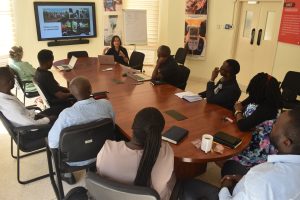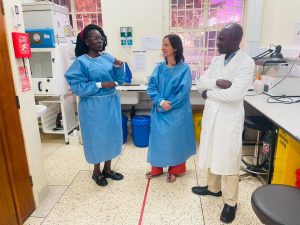A distinguished collaborator and senior researcher from the Royal Museum for Central Africa in Belgium, Dr. Tine Huyse, recently visited the Uganda Schistosomiasis Multidisciplinary Research Centre (U-SMRC), an opportunity to strengthen ongoing partnerships and deepen discussions around molecular approaches to schistosomiasis control.
During her visit on Thursday, 16 May 2025, Dr. Huyse delivered an engaging seminar on “schistosome hybridization,” a topic at the frontier of parasite evolution and disease control. Her talk shed light on how genetic mixing between different schistosome species could influence transmission patterns, diagnostic accuracy, and treatment effectiveness.

Dr. Tine Huyse delivers a seminar on schistosome hybridization to researchers at U-SMRC.
“Hybridization among schistosomes has important implications for transmission dynamics, diagnostics, and treatment strategies,” she explained. “Understanding how these species are evolving and adapting is essential if we are to design effective and sustainable control programmes.”
The session sparked engaging discussions among the scientists, especially on the potential of molecular tools to enhance schistosomiasis surveillance and control systems in Uganda.
Following the seminar, Dr. Huyse toured the state-of-the-art snail laboratories, which play a critical role in identifying and monitoring the intermediate host snails of Schistosoma parasites. These labs support research on the ecology, genetics, and population dynamics of snail vectors, essential components in understanding local transmission and piloting innovative control strategies.

Dr. Huyse interacts with our PhD students in the snail lab.
The visit highlighted the importance of interdisciplinary collaboration and international knowledge exchange in tackling complex global health issues. Dr. Huyse’s insights are expected to inform ongoing projects at U-SMRC focused on hybrid detection, parasite-host interactions, and the development of molecular diagnostics.
U-SMRC continues to position itself as a regional hub for integrated research and innovation in the fight against schistosomiasis and other NTDs. Dr. Huyse’s visit is part of a broader effort to strengthen global research networks and drive evidence-based interventions in endemic communities.









